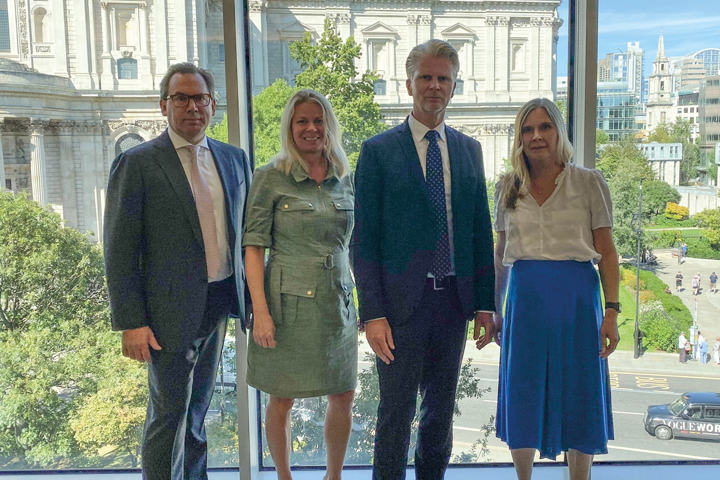
From gas to green heating – How Vattenfall Heat is transforming Scottish homes
25 October 2023
If the UK is to reach its target of becoming net zero by 2050, it urgently needs to switch to more sustainable heating solutions. Swedish energy group and SCC patron Vattenfall Heat is playing a key role in the country’s shift from gas to green heating, aiming to transform the equivalent of 170,000 homes in Scotland alone. The Link spoke with Paul Steen, Head of Business Development North at Vattenfall Heat UK, about the ambitious plans to turn the UK greener.
If the UK is going to reach the target of net zero emissions by 2050, it needs to accelerate the transition now, by lowering carbon and renewable energy for homes and businesses – ending its reliance on fossil fuels.
Today, approximately 85% of British homes have a gas boiler, and together they produce 92 million tonnes of carbon dioxide each year – making up for 14% of the UK’s total emissions. This means, Paul explains, that if the country wants to reach its net zero targets, heating needs to be part of the plan.
“Heating is an often overlooked but crucial part of this change. In fact, the government’s own scientific advisors have highlighted the lack of progress on low carbon heating as a key concern. Hence, we want to unleash the potential of district heating networks as an essential means of decarbonising heating and hot water on a city scale.”
Paul believes that the UK has great potential to switch to more sustainable heating solutions, particularly district heating, as the placement of many buildings is advantageous for the infrastructure needed.
“In the UK, the opportunity to scale up district heating is huge; half of all UK buildings are in areas suitable for connection to a district heating network, and these networks offer a unique way to connect swathes of homes and businesses to local waste heat and renewable energy at once.”
Bringing Swedish heating solutions to the UK
Founded in 1909, Vattenfall has been operating in the UK since 2008, initially focusing on delivering wind energy and fossil free electricity. In 2018, Vattenfall Heat UK was set up as a specialist subsidiary, focused on creating a national district heating network by working with local authorities, commercial organisations and communities.
“Vattenfall already built and operated such networks in 25 cities across Sweden, Germany, the Netherlands and Denmark – with nearly two million end users. In the UK, we partnered up with three progressive places, in London, Bristol and outside of Edinburgh, to transform the way communities are heated, and help them deliver their net zero ambitions.”
Scotland is a key region in Vattenfall Heat’s plans, and in 2020, the company set up a 50/50 partnership with the Midlothian Council, benefitting from its long-term plan to invest £100 million in low carbon heating. The aim of the joint initiative, Paul explains, is to deliver district heating networks that will provide heating and hot water for the equivalent of 170,000 homes in Edinburgh and Midlothian by 2050.
Building smart and sustainable cities
The first project in Midlothian Council and Vattenfall Heat’s partnership is the design and construction of a district heating network for Shawfair Town – a sustainable new town currently under construction. It will be located 15-minutes by train from Edinburgh city centre and is one of Scotland’s largest planning and building projects at the moment.
“Shawfair Town will be a community of around 4,000 homes, with three new schools, extensive cycling and walking networks and large areas of public open space – as well as retail, business, and community facilities. It will be heated by a low carbon district heating network that will provide reliable heating and hot water at a fair price. “
The project is expected to save over 2,500 tonnes of CO2 per year – the equivalent of taking 1,200 cars off the road – by using local resources to generate more climate friendly heating.
“The district heating network will generate 160 gigawatts of low carbon heat each year. It will partly be powered by waste heat from Millerhill Recycling and Energy Recovery Centre – a new rubbish incineration plant – and the aim is to supplement it with other local sources of waste heat, including old mine workings and sewers.”
Scotland on the road to net zero
Like the rest of the UK, Scotland is working hard on reducing its carbon emissions, and the government encourages businesses who are helping the region in the right direction – such as Vattenfall Heat.
“Scotland has set legally-binding emissions reductions targets – 50% of its energy is to be low carbon by 2030 and its energy system is to be entirely decarbonised by 2050 – and its government is actively working to accelerate progress to this cleaner and better future. For example, our Shawfair project will benefit from up to £7.3 million from the Scottish Government’s Low Carbon Infrastructure Transformation Project.”
Thanks to the government’s high ambitions when it comes to reducing its CO2 footprint, Paul is optimistic about the concept spreading to more cities, and perhaps even to a national level.
“We hope the success of our district heating network at Shawfair Town will demonstrate to Scots the huge benefits of this kind of heating system. The idea is that demand will grow once people see how entire districts of towns and cities can be switched to affordable low carbon energy in one fell swoop.”
As the net zero deadline gets closer, Paul believes the need for sustainable heating will grow. “The climate clock is ticking – we urgently need to cut emissions. Bold action is needed now to transform and futureproof our energy system to achieve the goal of net zero emissions by 2050. District heating is the enabling infrastructure needed to get there in time.”



Let's stay connected
and keep up-to-date with the Chamber's news and events.
Read our Privacy Policy here